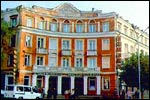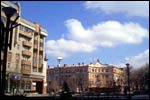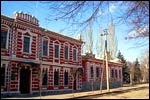

|
|
HISTORY OF KRIVOY ROG.
At the end of the 17th - beginning of the 18th century the Cossack Cordon appeared at the confluence of the Ingultsa and Saksagan rivers. The confluence of the rivers was named Pochtovaya. The Cossacks from Zaporozhye rested on the way to Sech. Legend says that the owner of this settlement was a Cossack named Rog who had lost one eye in battle. That is why he was called Krivoy Rog in Zaporozhskaya Sech. Some more Cossacks settled around the Cossack Rog 's house, and a village grew up gradually. The Cossacks gave a name to it - Krivoy Rog. In 1775 the Empress Catherine II reclassified Krivoy Rog as a town.
 The town was growing and by the middle of the 19th century the population was tens of thousands of people. The main street of the city (under the name of Karl Marx) was named Pochtovaya. There were two railway stations in the town.
The town was growing and by the middle of the 19th century the population was tens of thousands of people. The main street of the city (under the name of Karl Marx) was named Pochtovaya. There were two railway stations in the town.
The town began to grow really rapidly only when iron-ore reserves were found there. Aleksander Pol found them in the end of 19th century. The first steel tones were welded by the Mining Equipment Factory of the manufacturer Gdantsev. Krivoy Rog grew up very fast. The settlements having been separate now joined into one big town but the old names of them were kept: Gdantsevka, Dekanka, Karnavatka, Sukhaya Balka, Chervonaya Balka etc.. This process went on till the middle of 20th century.
 In the times of the First World War Krivoy Rog was occupied by the troops of Kaizer Wilgelm. The clandestine struggle was active in the town. After the First World War an intellectual ferment captured Krivoy Rog as the whole Russian Empire. Our town survived through revolution, and Civil War. After a coup d'etat, the power passed on to the People, the Soldiers and Deputies Councils. The main Cathedral was destroyed. The destruction occurred in the Cathedral Square of the town. Slowly life took a peaceful turn and the research of iron-ore became more intensified. Before the revolution, people descended to the mines on staircases, in the 1930ies. During the rest of 20th century the mines have become deeper and more iron-ore was mined.
In the times of the First World War Krivoy Rog was occupied by the troops of Kaizer Wilgelm. The clandestine struggle was active in the town. After the First World War an intellectual ferment captured Krivoy Rog as the whole Russian Empire. Our town survived through revolution, and Civil War. After a coup d'etat, the power passed on to the People, the Soldiers and Deputies Councils. The main Cathedral was destroyed. The destruction occurred in the Cathedral Square of the town. Slowly life took a peaceful turn and the research of iron-ore became more intensified. Before the revolution, people descended to the mines on staircases, in the 1930ies. During the rest of 20th century the mines have become deeper and more iron-ore was mined.
 The iron content in iron-ore from Krivoy Rog is very high. That is why it was decided to build Iron and Steel Works. In 1932 the construction of Krivoy Rog Iron and Steel Works began under the guidance of the Director Vestnik. (In 1937 he was subjected to repression with his wife). The living district Sotsgorod (Socialistic Town) had been erected along with the Works. The first town tram was set out. On August 5, 1936 the first blast furnace "Komsomolka" gave the first cast iron (The blast furnace has been working even in present times). Until the beginning of the war in 1941 there were 3 blast furnaces, with open-hearth and rolling sections working. Krivoy Rog has become a large industrial city. On September 11, 1941 it was occupied by Hitler's troops. It had been occupied until February 22, 1944. During this time, the Germans didn't manage to export a tone of iron-ore, cast iron or steel from Krivoy Rog.
The iron content in iron-ore from Krivoy Rog is very high. That is why it was decided to build Iron and Steel Works. In 1932 the construction of Krivoy Rog Iron and Steel Works began under the guidance of the Director Vestnik. (In 1937 he was subjected to repression with his wife). The living district Sotsgorod (Socialistic Town) had been erected along with the Works. The first town tram was set out. On August 5, 1936 the first blast furnace "Komsomolka" gave the first cast iron (The blast furnace has been working even in present times). Until the beginning of the war in 1941 there were 3 blast furnaces, with open-hearth and rolling sections working. Krivoy Rog has become a large industrial city. On September 11, 1941 it was occupied by Hitler's troops. It had been occupied until February 22, 1944. During this time, the Germans didn't manage to export a tone of iron-ore, cast iron or steel from Krivoy Rog.
After the deliberations of Krivoy Rog, the Krivoy Rog Iron and Steel Works and the mines were reconstructed. In the middle of the 1950s the iron-enriching factories appeared. Nowadays there are about 1 million people in Krivoy Rog, 7 districts, 4 iron-enriching factories, a large amount enterprises involved in food and light industries etc...
 There are a lot of legends about our city-Krivoy Rog. One of them says that the city was established by one Cossack. He was named Rog. But everybody was used to call him "Krivoy Rog" because he had an eye put out by sabre in a cruel battle with Tatar invaders. When going on a journey he took a lot of salt with him and on the way he gave it to the people. Having passed some way he decided to settle down; and, at the place where the two rivers, the Ingultsa and Saksagan converge, he established a settlement. He had a lot of people coming to his place: some came to ask for salt, some stayed for a night after a long trip, some came to listen his stories about the war and some came to ask for a good advice.
There are a lot of legends about our city-Krivoy Rog. One of them says that the city was established by one Cossack. He was named Rog. But everybody was used to call him "Krivoy Rog" because he had an eye put out by sabre in a cruel battle with Tatar invaders. When going on a journey he took a lot of salt with him and on the way he gave it to the people. Having passed some way he decided to settle down; and, at the place where the two rivers, the Ingultsa and Saksagan converge, he established a settlement. He had a lot of people coming to his place: some came to ask for salt, some stayed for a night after a long trip, some came to listen his stories about the war and some came to ask for a good advice.
As a result, more settlements appeared around Krivoy Rog. The Cossack Rog died when he was very old, and the settlement kept on bearing the name of the founder - Krivoy Rog.
| Krivoy Rog Romance Tour Details |
| |
|
|
|
| Romance Tours |
 Russian Women Tours Russian Women Tours
 Latin Women Tours Latin Women Tours
 Peru, Latin Women Tours Peru, Latin Women Tours
 Costa Rica, Latin Women Tours Costa Rica, Latin Women Tours
|
 Ukraine Women Tours Ukraine Women Tours
 Thailand, Asian Women Tours Thailand, Asian Women Tours
 Philippines, Asian Women Tours Philippines, Asian Women Tours
 Multiple Cities Women Tours Multiple Cities Women Tours
|
| |
test
|
|
|
|


 The town was growing and by the middle of the 19th century the population was tens of thousands of people. The main street of the city (under the name of Karl Marx) was named Pochtovaya. There were two railway stations in the town.
The town was growing and by the middle of the 19th century the population was tens of thousands of people. The main street of the city (under the name of Karl Marx) was named Pochtovaya. There were two railway stations in the town.
 In the times of the First World War Krivoy Rog was occupied by the troops of Kaizer Wilgelm. The clandestine struggle was active in the town. After the First World War an intellectual ferment captured Krivoy Rog as the whole Russian Empire. Our town survived through revolution, and Civil War. After a coup d'etat, the power passed on to the People, the Soldiers and Deputies Councils. The main Cathedral was destroyed. The destruction occurred in the Cathedral Square of the town. Slowly life took a peaceful turn and the research of iron-ore became more intensified. Before the revolution, people descended to the mines on staircases, in the 1930ies. During the rest of 20th century the mines have become deeper and more iron-ore was mined.
In the times of the First World War Krivoy Rog was occupied by the troops of Kaizer Wilgelm. The clandestine struggle was active in the town. After the First World War an intellectual ferment captured Krivoy Rog as the whole Russian Empire. Our town survived through revolution, and Civil War. After a coup d'etat, the power passed on to the People, the Soldiers and Deputies Councils. The main Cathedral was destroyed. The destruction occurred in the Cathedral Square of the town. Slowly life took a peaceful turn and the research of iron-ore became more intensified. Before the revolution, people descended to the mines on staircases, in the 1930ies. During the rest of 20th century the mines have become deeper and more iron-ore was mined.
 The iron content in iron-ore from Krivoy Rog is very high. That is why it was decided to build Iron and Steel Works. In 1932 the construction of Krivoy Rog Iron and Steel Works began under the guidance of the Director Vestnik. (In 1937 he was subjected to repression with his wife). The living district Sotsgorod (Socialistic Town) had been erected along with the Works. The first town tram was set out. On August 5, 1936 the first blast furnace "Komsomolka" gave the first cast iron (The blast furnace has been working even in present times). Until the beginning of the war in 1941 there were 3 blast furnaces, with open-hearth and rolling sections working. Krivoy Rog has become a large industrial city. On September 11, 1941 it was occupied by Hitler's troops. It had been occupied until February 22, 1944. During this time, the Germans didn't manage to export a tone of iron-ore, cast iron or steel from Krivoy Rog.
The iron content in iron-ore from Krivoy Rog is very high. That is why it was decided to build Iron and Steel Works. In 1932 the construction of Krivoy Rog Iron and Steel Works began under the guidance of the Director Vestnik. (In 1937 he was subjected to repression with his wife). The living district Sotsgorod (Socialistic Town) had been erected along with the Works. The first town tram was set out. On August 5, 1936 the first blast furnace "Komsomolka" gave the first cast iron (The blast furnace has been working even in present times). Until the beginning of the war in 1941 there were 3 blast furnaces, with open-hearth and rolling sections working. Krivoy Rog has become a large industrial city. On September 11, 1941 it was occupied by Hitler's troops. It had been occupied until February 22, 1944. During this time, the Germans didn't manage to export a tone of iron-ore, cast iron or steel from Krivoy Rog.
 There are a lot of legends about our city-Krivoy Rog. One of them says that the city was established by one Cossack. He was named Rog. But everybody was used to call him "Krivoy Rog" because he had an eye put out by sabre in a cruel battle with Tatar invaders. When going on a journey he took a lot of salt with him and on the way he gave it to the people. Having passed some way he decided to settle down; and, at the place where the two rivers, the Ingultsa and Saksagan converge, he established a settlement. He had a lot of people coming to his place: some came to ask for salt, some stayed for a night after a long trip, some came to listen his stories about the war and some came to ask for a good advice.
There are a lot of legends about our city-Krivoy Rog. One of them says that the city was established by one Cossack. He was named Rog. But everybody was used to call him "Krivoy Rog" because he had an eye put out by sabre in a cruel battle with Tatar invaders. When going on a journey he took a lot of salt with him and on the way he gave it to the people. Having passed some way he decided to settle down; and, at the place where the two rivers, the Ingultsa and Saksagan converge, he established a settlement. He had a lot of people coming to his place: some came to ask for salt, some stayed for a night after a long trip, some came to listen his stories about the war and some came to ask for a good advice.